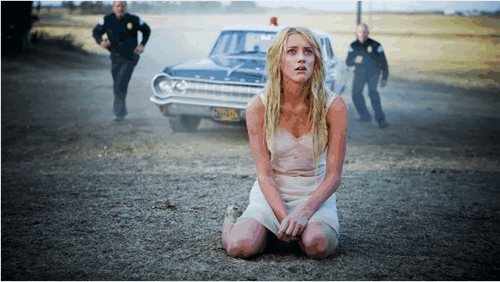Zombos Says: Fair
All the ingredients are here for a scary ghost story: there's a tragic mystery to solve; people disappearing all around; the doom of being locked in with a malevolent spirit; and the vexing problem that no one believes you. John Carpenter can't seem to put them in the right order to provide suspense or mounting terror in The Ward, a surprisingly dull effort from a director who should know better. Gregory Nicotero's stalking ghost is not scary, only perfunctory, like he was doing a Face Off contest entry. He should know better, too. Amber Heard as Kristen is believable and fiesty, but it's the movie that isn't. As for the other characters, they're window mannequins for dressing the story, but being well worn over, they hold little interest. No one broke a bead of sweat in this movie, onscreen or off, and that's certainly not conducive to good horror drama, especially when it takes place in a mental ward.
It's 1966. Kristen runs through the woods in a slip and sneakers to a farmhouse and sets it ablaze. The police take her to North Bend Psychiatric Hospital. Maybe that's where she escaped from. She suffers from sudden flashbacks involving a young girl bound in shackles, locked in the basement of a farmhouse, sexually assaulted by a brutish figure. Kristen doesn't seem to have any memory beyond knowing her own name. She's told to take her medications and behave. This isn't One Flew Over the Cuckoo's Nest (1975) or Shock Treatment (1964): the orderlies and Dr. Stringer (Jared Harris) are stern but they really do want to help her with their shock treatments and little pill cup dosages. If you've seen any stuck-in-a-mental-ward movies, you already know all the tricks she pulls to keep from swallowing her pills. Carpenter has seen them, too. He even cracks out the old chestnut of an air-vent big enough for Kristen to shimmy through in one of her escape attempts, the metal grille of which is conveniently fastened by flat-head screws a handy penny can open.
The penny comes from another patient, Zoey (Laura-Leigh), a girl so regressed she acts like a child, sucking her thumb, her hair in ponytails, and clutching a small stuffed animal. The other patients, oddly there are only three more--Iris (Lyndsy Fonseca), Sarah (Danielle Panabaker), and Emily (Mamie Gummer)--are frightened by the ghost of Alice (Jillian Kramer), a former patient now prowling the halls looking to punish them. "Why?" is the driving question that Carpenter's fabricated mental ward with few patients to treat, mostly empty hallways, and with a surprisingly small staff to ignore Kristen's concerns and fears, will eventually be revealed.
Once you get past the shock-drop opening before the credits roll, when Tammy is dispatched during a dark and stormy night by Alice, the remaining actions and terrors build in preposterous leaps and bounds, although the ending provides the explanation for this. Once explained, however, the red herring-ish opening scene becomes contextually improbable (and if I weren't so polite, I'd even say nonsensical.) Clearly its only purpose is a contrived jolt, effective, but meaningless. the explanation confuses more than it clarifies, making the logic-bending events leading up to it even less plausible. I can't really tell you why because that would be a major spoiler; but should you see this movie to the ending, think about Kristen's companions throughout, their physical presence around the ward, the aside deadends each of them reaches when Alice comes calling, then ask yourself how any of it can be pieced together realistically for the story's sake. Any one of Hanna-Barbera's Scooby Doo cartoons make more sense than this script.
As for me, I'm asking why Carpenter insists on repeating past mistakes. His eye's better than this. His story-sense is better than this. When the dramatic opening credits, animated in splintering glass shards reflecting images as they fly through space, trumps the movie itself, I can't fathom how you wouldn't have questions to ask here.




I thought the same thing about this film. It's surprising that Carpenter utilizes such contrived scares and plot convenience for the film, as some of the opening scenes do display some creepy atmosphere. I too found the "surprise" ending bothersome because of earlier plotholes; if a film's going to go that route, it better make sense!
Posted by: Ryne | February 15, 2012 at 12:06 AM